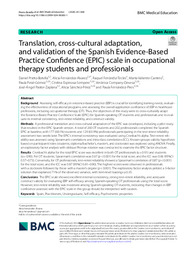Título :
Translation, cross‑cultural adaptation, and validation of the Spanish Evidence‑Based
Practice Confidence (EPIC) scale in occupational therapy students and professionals |
Autor :
Prieto‑Botella, Daniel
Fernández‑Álvarez, Alicia
Ferrándiz‑Tecles, Raquel
Valiente‑Cantero, Marta
Peral‑Gómez, Paula
Espinosa‑Sempere, Cristina
Company Devesa, Verónica 
Pastor Zaplana, Jose Angel 
Sánchez‑Pérez, Alicia
Fernández Pires, Paula  |
Editor :
BMC |
Departamento:
Departamentos de la UMH::Patología y Cirugía |
Fecha de publicación:
2024-11-26 |
URI :
https://hdl.handle.net/11000/34896 |
Resumen :
Background Assessing self-efficacy in evidence-based practice (EBP) is crucial for identifying training needs, evaluating the effectiveness of educational programs, and assessing the overall application confidence of EBP in healthcare professions, including occupational therapy (OT). Thus, the objectives of this study were to cross-culturally adapt the Evidence-Based Practice Confidence Scale (EPIC) for Spanish-speaking OT students and professionals and to evaluate
its internal consistency, test–retest reliability, and construct validity. Methods A professional translation and cross-cultural adaptation of the EPIC was developed, including a pilot study that resulted in the EPIC Spanish version. A total of 260 OT students and 202 professionals completed the Spanish EPIC at baseline, with 177 (68.1%) students and 129 (63.9%) professionals participating in the test–retest reliability assessment two weeks later. The EPIC’s internal consistency was evaluated using Cronbach’s alpha. Test–retest reliability
was assessed using Spearman’s correlations and intra-class correlations (ICC). Known-groups validity hypothesis based on participants’ roles (students, diploma/bachelor’s, master’s, and doctorate) was explored using ANOVA. Finally, an exploratory factor analysis with oblique Promax rotation was conducted to examine the EPIC factor structure. Results Cronbach’s alpha for the total EPIC score was excellent in both OT professionals (α = 0.91) and students
(α = 0.90). For OT students, Spearman’s correlation was 0.67 (p < 0.001) for the total score, and the ICC was 0.66 (95%CI
0.57–0.73). Conversely, for OT professionals, test–retest reliability showed a Spearman’s correlation of 0.87 (p < 0.001)
for the total score, and the ICC was 0.87 (95%CI 0.81–0.90). The highest scores were observed in professionals
with a doctorate followed by those with a master’s degree (p < 0.001). The exploratory factor analysis yielded a 3-factor
solution that explained 71% of the observed variance, with item-level loadings ≥ 0.35.
Conclusions The EPIC scale showed excellent internal consistency, strong test–retest reliability, and adequate
construct validity for evaluating EBP self-efficacy among Spanish-speaking OT professionals using the total score.
However, test–retest reliability was moderate among Spanish-speaking OT students, indicating that changes in EBP
confidence assessed with the EPIC scale in this group should be interpreted with caution.
|
Palabras clave/Materias:
Spain
practitioners
undergraduate
self-efficacy
psychometric properties |
Tipo de documento :
info:eu-repo/semantics/article |
Derechos de acceso:
info:eu-repo/semantics/openAccess
Attribution-NonCommercial-NoDerivatives 4.0 Internacional |
DOI :
10.1186/s12909-024-06383-1 |
Publicado en:
BMC Med Educ . 2024 Nov 26;24(1):1368 |
Aparece en las colecciones:
Artículos Patología y Cirugía
|

 La licencia se describe como: Atribución-NonComercial-NoDerivada 4.0 Internacional.
La licencia se describe como: Atribución-NonComercial-NoDerivada 4.0 Internacional.
.png)